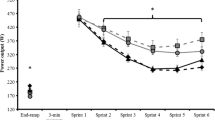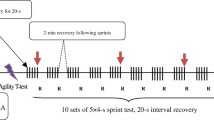Summary
The influence of specific training on benefits from caffeine (Caf) ingestion was examined during a sprint test in a group of highly trained swimmers (T) and compared with the response of a group of untrained occasional swimmers (UT). Seven T and seven UT subjects swam freestyle two randomly assigned 2 × 100 m distances, at maximal speed and separated by 20 min of passive recovery, once after Caf (250 mg) and once after placebo (Pla) ingestion. Anaerobic capacity was assessed by the mean velocity (meters per second) during each 100 m and blood was sampled from the fingertip just before and 1, 3, 5, 7, and 9 min after each 100 m for resting and maximal blood lactate concentration ([1a−]b, max) determination. The [[1a−]b, max was significantly enhanced by Caf in both T and UT subjects (P<0.01). However, only T subjects exhibited significant improvement in their swimming velocity (P<0.01) after Caf or any significant impairment during the second 100 m. In light of these results, it appears that specific training is necessary to benefit from the metabolic adaptations induced by Caf during supramaximal exercise requiring a high anaerobic capacity.
Similar content being viewed by others
References
Anselme F, Collomp K, Mercier B. Ahmaidi S, Préfaut C: Caffeine increases maximal anaerobic power and blood lactate. Eur J Appl Physiol, in press
Bernadi L, Salvucci F, Suardi R, Solda PL, Calciati A, Perlini S, Falcone C, Ricciardi L (1990) Evidence for an intrinsic mechanism regulating heart rate variability in the transplanted and the intact heart during submaximal dynamic exercise? Cardiovasc Res 24:969–981
Chatard JC, Paulin M, Lacour JR (1988) Postcompetition blood lactate measurements and swimming performance: illustrated by data from a 400 m Olympic record holder. In: Ungerechts BE, Wilke K, Reischle R (eds) Swimming science V. Human Kinetics, Champaign, Ill., pp 311–316
Collomp K, Ahmaidi S, Audran M, Chanal JL, Préfaut C (1991) Effects of caffeine ingestion on performance and anaerobic metabolism during the Wingate test. Int J Sports Med 12:439–443
Costill DL, Dalsky GP, Fink WJ (1978) Effects of caffeine ingestion on metabolism and exercise performance. Med Sci Sports 10:155–158
Csete ME, Abraham WM, Wanner A (1990) Vasomotion influences airflow in peripheral airways. Am Rev Respir Dis 141:1409–1413
Falk B, Burstein R, Ashkenazi I, Silberg O, Alter J, Zylber-Katz E, Rubinstein A, Bashan N, Shapiro Y (1989) The effects of caffeine ingestion on physical performance after prolonged exercise. Eur J Appl Physiol 59:168–173
Horswill CA, Costill DL, Fink WJ, Flynn MG, Kirwan JP, Mitchell JB, Houmard JA (1988) Influence of sodium bicarbonate on sprint performance: relationship to dosage. Med Sci Sports 20:566–569
Ivy JL, Costill DL, Fink WJ, Lower RW (1979) Influence of caffeine and carbohydrate feedings on endurance performance. Med Sci Sports 11:6–11
Jacobs I, Esbjörnsson M, Sylven C, Holm I, Jansson E (1987) Sprint training effects on muscle myoglobin, enzymes, fiber types, and blood lactate. Med Sci Sports 19:368–374
Keskinen KL, Komi PV, Rusko H (1989) A comparative study of blood lactate tests in swimming. Int J Sports Med 10:197–201
Medbo JI, Burgers S (1990) Effect of training on the anaerobic capacity. Med Sci Sports Exerc 22:501–507
Nevill ME, Boobis LH, Brooks S, Williams C (1989) Effect of training on muscle metabolism during treadmill sprinting. J Appl Physiol 67:2376–2382
Powers SK, Byrd RJ, Tulley R, Callender T (1983) Effects of caffeine ingestion on metabolism and performance during graded exercise. Eur J Appl Physiol 50: 301–307
Robertson D, Wade D, Workman R, Woosley RL, Oates JA (1981) Tolerance to the humoral and hemodynamic effects of caffeine in man. J Clin Invest 67:1111–1117
Sasaki H, Maeda J, Usui S, Ishiko T (1987) Effects of sucrose and caffeine ingestion on performance of prolonged strenuous running. Int J Sports Med 8:261–265
Sharp RL, Costill DL, Fink WJ, King DS (1986) Effects of eight weeks of bicycle ergometer sprint training on human muscle buffer capacity. Int J Sports Med 7:13–17
Sjogaard G (1983) Electrolytes in slow and fast muscle fibers of humans at rest and with dynamic exercise. Am J Physiol 245:825–831
Szögy A (1988) Assessment of anaerobic capacity in swimmers by a two phase laboratory and field test. In: Ungerechts BE, Wilke K, Reischle R (eds) Swimming science V. Human Kinetics, Champaign, Ill., pp 305–310
Yamada Y, Nakazato Y, Ohga A (1989) The mode of action of caffeine on catecholamine release from perfused adrenal glands of cat. Br J Pharmacol 98:351–356
Author information
Authors and Affiliations
Rights and permissions
About this article
Cite this article
Collomp, K., Ahmaidi, S., Chatard, J.C. et al. Benefits of caffeine ingestion on sprint performance in trained and untrained swimmers. Europ. J. Appl. Physiol. 64, 377–380 (1992). https://doi.org/10.1007/BF00636227
Accepted:
Issue Date:
DOI: https://doi.org/10.1007/BF00636227




